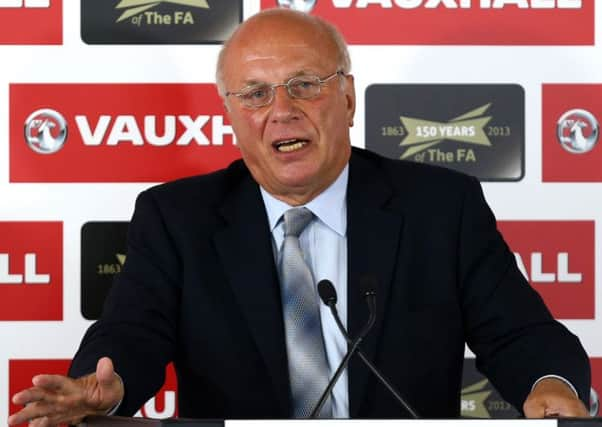Inquest opens as England’s talent pool evaporates!


Now the FA Commission, formulated by Football Association chief Greg Dyke, will research how the nation’s evaporating pool of talent can overcome the foreign armada.
While Roy Hodgson focuses on the task in hand - earning qualification for the 2014 World Cup in Brazil - Dyke, alongside Premier League and Football League chairmen Anthony Fry and Greg Clarke and LMA and PFA chairmen Howard Wilkinson and Clarke Carlisle, will begin the process of implementing ideas and resolutions for change in a bid to enhance the prospects of the national team in future tournaments.
Advertisement
Hide AdAdvertisement
Hide AdAs the transfer window closed for business last week, record statistics were being regurgitated by overzealous media conglomerates nationwide. Deloitte confirmed a record £630 million was spent by top tier clubs in a single window, with £140 million of that being spent by those clubs in a madcap deadline day frenzy. A world record fee was also spent on an individual player once Gareth Bale’s £85 million transfer from Spurs to Real Madrid was processed while Arsenal almost trebled their club record to capture German international Mesut Ozil for £42.4 million.
But not even nine figure sums could cast the more alarming percentages in to the shadows. The Premier League’s birth in August 1992 saw 69 per cent of players, featuring in opening day starting XIs, hold eligibility for England’s national team. However, that statistic has suffered an exceptional decline as only a shallow reservoir - 32 per cent - of indigenous talent began the 2012/13 campaign. That figure rose imperceptibly to 33.6 per cent at the start of this term but the numbers will only torpidly flat line at best.
All the evidence is suggestive of a desperate plight for English football and its future. Remarkably 77.8 per cent (£490 million) of the frenetic spending of Premier League clubs in the transfer window went to overseas clubs for foreign acquisitions with a purported nine per cent being spent on Englishmen. And when marrying the business carried out in the Championship, just 116 (42.8 per cent) of 271 players involved in transfers – including loan deals – held English nationality.
Dyke outlined that steps have been put in place to blood the country’s next generation. St George’s Park has become the country’s iconic epicentre for the development of England’s nationals while at club level £340 million has been ploughed in to the academy structured Elite Player Performance Plan.
Advertisement
Hide AdAdvertisement
Hide AdIt’s not there where the current problem lies though. For the under 21 bracket, the conveyor belt is usually barricaded on reaching squad level. Last season the number of English players under the age of 21 who appeared in the Premier League filled only 2.3 per cent of the total number of minutes played.
Incredibly only three – Ross Barkley, Jonjo Shelvey and Nathan Redmond - of the 23-man England Under 21 squad that beat Scotland 6-0 last month started for Premier League clubs on the opening weekend this term.
And you worry about the rest. Andros Townsend has been influential for Spurs to date, but the clubs acquired riches could see the youngster benched in preference for new assets including Paulinho, Erik Lamel and Nacer Chadli while Aaron Lennon – another Englishman – along with Gylfi Sigurdsson are also in competition for those places.
Jack Rodwell, another promising youngster who has made three senior international appearances, could also fall victim to the lucrative wealth of Manchester City. The proverbial elbow is looming and could severely stunt progression.
Advertisement
Hide AdAdvertisement
Hide AdLegislation denounces that eight players in Premier League squads of 25 are required to be home-grown. Similar quotas need to be introduced for players appearing in the starting XI, though Dyke would be likely to face legal challenges from the division’s representatives should that be suggested.
After replacing David Bernstein at the helm, Dyke hasn’t exactly shied away from his duties. Though his recent revelation was hardly enlightening – even your average man on the street was aware of the problems – it’s heartening to see somebody finally taking a stand.
Though we all know actions speak louder than words!
What do you think should be done to improve the fortunes of the National side?